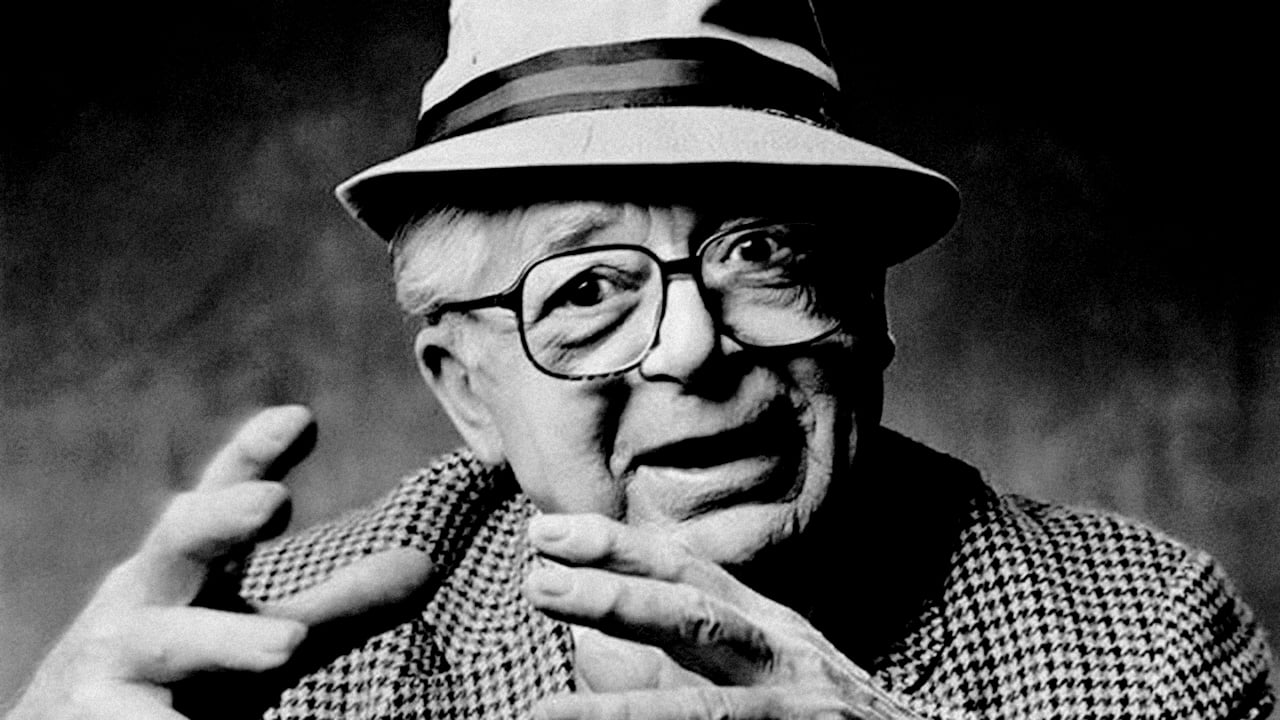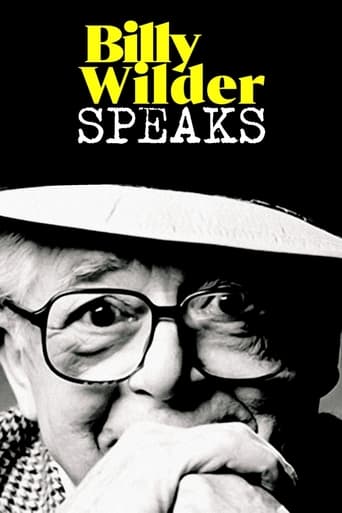Diagonaldi
Very well executed
GarnettTeenage
The film was still a fun one that will make you laugh and have you leaving the theater feeling like you just stole something valuable and got away with it.
Clarissa Mora
The tone of this movie is interesting -- the stakes are both dramatic and high, but it's balanced with a lot of fun, tongue and cheek dialogue.
Edwin
The storyline feels a little thin and moth-eaten in parts but this sequel is plenty of fun.
MartinHafer
Billy Wilder was a genius when it came to writing and directing films. There's no doubt about that and listening to him reminisce makes this documentary worth seeing--particularly for film buffs like myself. I thoroughly enjoyed listening to him talking with Volker Schlöndorff ("The Tin Drum"). However, from a technical point of view, the film really sucks as well. Let me explain. There are a could serious problems which could have and should have been dealt with--especially since the film was made by a director about a director. The conversation often lacks a systematic focus. Often, the chronology of what they are talking about is all mixed up and you'd think there'd be some sense of cohesion to the conversation in the film. There isn't...and it is odd. The total effect is like overhearing a couple guys talking but only catching a bit here and there.
blanche-2
Maybe I'm crazy -- entirely possible -- but this seems to me to be identical to "Billy Wilder, wie haben Sie's gemacht?" which is another documentary containing the same interview. I'm not saying it's not edited differently or whatever - I don't know the material that well - but the interview with Wilder seemed the same. He speaks a great deal in German and tells some wonderful stories about Marilyn Monroe, Marlene Dietrich, Audrey Hepburn, the making of Sunset Boulevard and Sabrina, and the films he made about the concentration camps after the war that were shown in Germany.Wilder was a marvelous raconteur speaking in English or German, and his explanation of why he used "Isn't it Romantic" in so many Paramount films is hilarious, as are his stories of the first showing of Sunset Boulevard and trying to get Monroe to say It's me, Sugar," instead of "Sugar, it's me" in "Some Like it Hot." The stories are unforgettable, which is why I know I already heard them in "Billy Wilder, wie haben Sie's gemacht?" Well worth seeing if you're a fan of Wilder or just a film buff. He was a true genius and a lively personality.
Robert J. Maxwell
I guess every director, like every human being, has quirks. Ford chewed on a hankie. Hawks spoke in a drawl so slow that it sounded at times like an old-fashioned vinyl 78 record being played at 45 rpm. Hitchcock always wore a dark suit on the set and in his earlier years made sure that the point of one of his collars curled upward.Billy Wilder's criterial attribute was body motion. He's never still. He never WAS still. The guy was in his mid-80s during these half dozen interviews with Schlondorff and he's constantly gesturing, twisting his head around, blinking, scratching his back, fiddling with some object like a pair of eyeglasses. When he was working he stalked around waving a walking stick, a very animated gnome.I'm not sure that anyone who is already familiar with his work will find out much new in these talks. There is the story of Marilyn Monroe unable to remember her single line -- "Where's that bourbon?" -- and Wilder having the line printed in large letters and taped to the walls and furniture. After some sixty takes of the scene, Wilder drew her aside and asked why there was a problem. Monroe: "What problem?" Wilder had other, less spectacular difficulties, with other performers but he holds no grudges and gives them credit for their various virtues. He's not mean about anyone he's worked with. As he tells Schlondorff, his philosophy is that you're not married to someone you happen to be working with. The arrangement lasts only a few months.He's great on anecdotes but seems to have told them so often that he's no longer excited or amused by them. At any rate, he doesn't laugh at them any more. And he tells them in a rushed tempo, sometimes in English, sometimes in German, and sometimes in a macaronic mixture of both, in a voice so studded with hesitations and stuttering that it's sometimes a little difficult to follow him in either language. "So -- so -- I told da -- da -- da sound man to crank up da -- da -- volume -- ent -- ent -- denn zwar lacherlich." He's not especially articulate. His metaphors are grounded in everyday experience. To Wilder, a successful movie should sweep the audience up, hold them in a choke around the neck, and never let them be reminded that they're just watching a movie. God forbid he should ever come up with a hoity-toity expression like "the suspension of disbelief" or "the epoche of the common man." It's an interesting documentary about a fascinating man who suffered a great deal of grief in Europe and who managed to sublimate his bitterness in art.
calvinnme
The maker of this documentary and director Billy Wilder originally intended what was filmed here to just be a dry run of what would be the later actual interview portion of a documentary on Wilder's career. The two sit down in Wilder's crowded office and Wilder just starts talking about the various aspects of his long career. The one stipulation that Wilder made was that this footage not be released in his lifetime. Wilder and the interviewer go back and forth between German and English - depending upon what language best expresses the points they wish to make - with helpful subtitles for those of us who speak English when either speaks German.Wilder says some things that don't surprise me - for example that Jack Lemmon was the definition of a professional. Wilder would not have used him so much and Lemmon would not have been such a great performer had that not been the case. However, Wilder's insights into Marilyn Monroe were new to me. He said while making "Some Like it Hot" that sometimes they would spend all day trying to get one take in which Marilyn had just one line, to the point where he wanted to pin the line to the wall so she could just read it. Other days she would come in and have pages of dialogue memorized. He also had some interesting things to say about making films on the Holocaust immediately after the war and the impact they had on German audiences at the time.At any rate, this dry run turned out to be so good that it became the actual interview. I highly recommend it to people who are interested in Billy Wilder's career, since it is almost entirely Billy Wilder talking about the projects he worked on, his philosophies of filmmaking, and the people with which he worked. It's a fascinating documentary.

